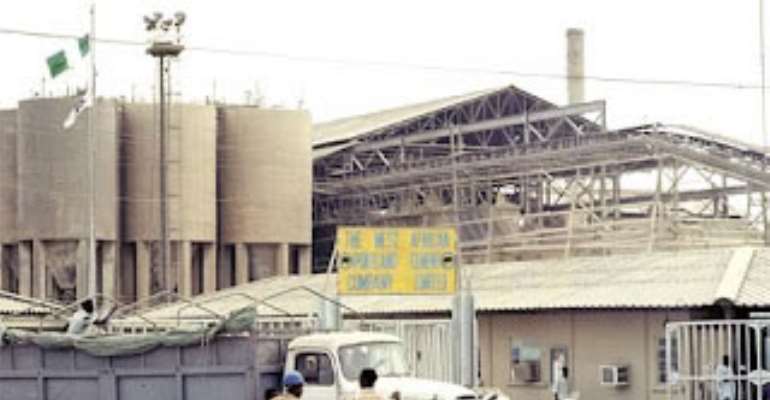Paying idle workers at Ajaokuta Steel – Punch

Accustomed to wasteful spending, the Federal Government has set aside N3.921 billion in the 2014 budget for the salaries of idle workers and other recurrent expenditure at Ajaokuta Steel Company Limited. No capital expenditure was provided and its employees would be mostly redundant throughout the year. A total of N4.58 billion was budgeted for the workers in 2012. The Ajaokuta project is a huge nightmare for Nigeria. With about $7 billion sunk into it since 1979 when it took off under the Shehu Shagari Administration, it is time the country ended this monument of economic wreck, corruption and lack of vision.
The blast furnace, a critical component of the plant, is yet to be completed, thus making it impossible for full operations to take place. It has also been argued that the technology Ajaokuta steel offers is obsolete and therefore, not sustainable. This ringing perception manacles every government or regime in fashioning the way forward. Ensconced in this whirlpool, the government of President Olusegun Obasanjo decided to concession the plant to an Indian firm, Global Infrastructure Holdings Limited, in 2004.
However, the deal collapsed as the firm failed to meet inherent contractual obligations. Workers of the company engaged GIHL in a protracted showdown over labour matters. This, and the allegation that the Indian company was running the firm aground, rather than re-invigorating it, compelled the Federal Government to cancel the transaction in 2007. It then re-possessed the company. However, GIHL did not go down without a fight. It headed for the London Court of International Arbitration and got some relief. One of the reprieves was that it should take over the Nigeria Iron Ore Mining Company - the raw material feeder to the steel company âˆ' to complete its tenure agreement with Nigeria. This arrangement has not been cemented yet.
Although the then Minister of Mines and Steel Development, Diezani Alison-Madueke, had planned to make the completed sections of the ASCL operational once again, her tenure was, however, short-lived. Musa Sada, her successor, said at a ministerial briefing last December that the company, along with NIOMC and Aladja Delta Steel Complex, would be revitalised by 2015 to produce a projected 3 million metric tons per annum. Also, he said that the Metallurgical Industry Regulation Act and Regulation Manual would soon be out, as a draft bill to this effect was being fine-tuned by the office of the Attorney-General of the Federation and Minister of Justice.
The minister's optimism of a bright future is shared by the sole administrator of ASCL, Joseph Onobere, who last year scoffed at the opinion that the plant was anachronistic. He stressed, 'The situation of the steel plant's equipment and facility is satisfactory, mechanically; the steel plant equipment and facilities are generally in good condition.'
We have heard enough of such tales by moonlight about the steel company. If there are no legal and regulatory frameworks to underpin the sector since 1979 when the sojourn in this seemingly steel wasteland began, it shows how asymmetrical the whole set-up is. The ASCL's squalid history is not different from that of the country's four refineries in Port Harcourt, Kaduna and Warri, which were to be sold off, and the defunct Power Holding Company of Nigeria, all of which represent milestones of the failure of governance and unreasonableness in policy implementation.
The Goodluck Jonathan Administration should not allow itself to be deceived into committing more funds to the ASCL. The ideal thing is to sell it off to private investors through a transparent process and settle the workers' terminal benefits immediately.
Foreign investors are willing to get involved if the government decides to go through the whole hog of privatising the company. In 2012, for instance, the Ukrainian government indicated interest on behalf of Ukrainian companies in acquiring the ASCL through its Ambassador to Nigeria, Serhii Khanenko, when he led a delegation of his country's investors on a visit to the Minister of Mines. He had explained that a Ukrainian company, Reprom, with a capacity for producing 3.9 metric tons per annum, was standing by to inject $2.6 billion into the steel company. Certainly, Ukrainian businessmen are not the only ones waiting in the wings.
Sada's envisaged revival of the project must be private sector led. In a troubled economy such as ours, the Ajaokuta steel investment, which has the potential to provide about 15,000 jobs, offers the best bet for the take-off of Nigeria's industrial age. But the Shagari government's ineptitude tangled with ethnic politics and corruption to mortgage the project to a tacky foundation. Russia, which provided the technical know-how for the project, was obviously not the best choice. Jonathan should end the country's 34-year-old nightmare, which Ajaokuta steel symbolises by resolving to sell it off quickly and openly.
